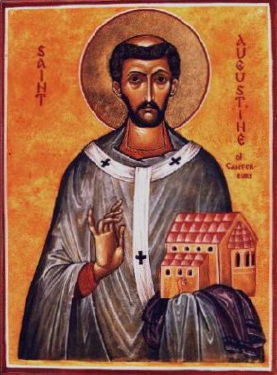|
|||
|---|---|---|---|
| This weekly bulletin insert complements the curriculum published by the Department of Christian Education of the Orthodox Church in America. This and many other Christian Education resources are available at http://dce.oca.org. | |||

The Church honors Saint Augustine of Canterbury, Evangelist of England and first Archbishop of Canterbury. Augustine of Canterbury is sometimes confused with the more well-known theologian Augustine of Hippo, who articulated many of the Roman Catholic Church's teachings. But the work of Augustine of Canterbury was mission rather than writing. Born in Rome in the later sixth century, Augustine entered a Benedictine monastery while young. He served under Pope Gregory, known to us as Gregory Dialogos, the compiler of the Presanctified Liturgy. The Pope had hoped to convert the pagan "Angles"—inhabitants of England—for several years. He would say of them, "The Angles indeed are worthy to be angels of God." So when he heard that many Angles were ready to accept the Christian faith if they could have good teachers, he seized the opportunity and appointed Augustine to lead a group of about forty missionaries to go and preach the faith in England. The men set out in June of 596. As they traveled through Gaul (now France) the locals told them unpleasant tales about the uncouth English, wild and ignorant people who couldn't be taught anything. This discouraged the missionaries so much that some wanted to give up and turn back. Augustine felt the same, and offered to return to Rome and tell Pope Gregory about the enormous difficulties they were sure to face. He went, but the Pope was not about to give up on his long-cherished hope. He said, "Go, in God's name! The greater your hardships, the brighter your crown." So Augustine rejoined his companions, and they made their way to Paris, where they spent the winter. When spring arrived, they set sail from a port city (possibly Boulogne) and landed on the Isle of Thanet, near Ramsgate in England. King Ethelburt came from the royal capital of Canterbury, described then as squalid and half in ruins, to meet them. He was gracious, but he wasn't remotely interested in this new faith they had come to preach. He gave them a building to live in, wished them well, and said they were free to gain as many converts as they could. As time went on, King Ethelburt became deeply impressed with Augustine's gentle manner and simple teaching. Encouraged by his Christian wife, the king asked to receive instruction, and then baptism. On Christmas Day in 597 more than 10,000 people were also baptized by Augustine, now Archbishop. Yet this same man whose unassertive way of teaching converted a king was utterly unsuccessful in his attempts to introduce uniform liturgical practices across the country. The Celtic bishops of South Britain found him to be overbearing and arrogant, and refused to cooperate with his suggestions. To the king he seemed humble and gentle; to some English bishops he seemed a too-proud Roman. Saints do struggle, and seldom please every person. That they can still be pleasing to God gives hope to the rest of us. |
|||
